有机食品与转基因食品的比较(英文)
有机食品与转基因食品的比较

GM food not only has low investment and high output value, but also has great contribution to solve the food problem.
Views on GM food and organic food
The comparative analysis of both GM food and organic food
LOGO
Contents
1 Definition odvantages and disadvantages
of GM food
3
Views on GM food and organic food
Definition of GM and organic food
Definition
GM foods
Organic food
GM food
• Genetically modified food refers to the genetically modified organism strain obtained by the use of GM technology, and the food processed and produced with the GM organism as direct food or raw material is called GM food.
有机食物和无机食物英语作文
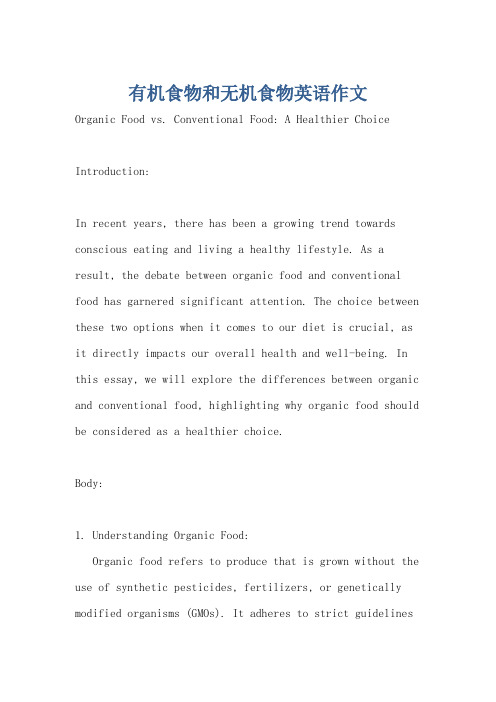
有机食物和无机食物英语作文Organic Food vs. Conventional Food: A Healthier ChoiceIntroduction:In recent years, there has been a growing trend towards conscious eating and living a healthy lifestyle. As a result, the debate between organic food and conventional food has garnered significant attention. The choice between these two options when it comes to our diet is crucial, as it directly impacts our overall health and well-being. In this essay, we will explore the differences between organic and conventional food, highlighting why organic food should be considered as a healthier choice.Body:1. Understanding Organic Food:Organic food refers to produce that is grown without the use of synthetic pesticides, fertilizers, or genetically modified organisms (GMOs). It adheres to strict guidelinesset by certification bodies to ensure its authenticity. Organic farming practices focus on promoting biodiversity and protecting the natural ecosystem.2. Benefits of Organic Food:- Nutritional Value: Studies have shown that organic fruits and vegetables contain higher levels of essential vitamins, minerals, and antioxidants compared to conventionally-grown counterparts.- No Harmful Chemicals: By consuming organic food, we minimize our exposure to harmful pesticides and chemicals that are commonly used in conventional farming practices. This reduces the risk of potential health problems such as hormone disruption, neurotoxicity, or even certain cancers. - Environmental Impact: Organic farming methodsprioritize soil conservation, water management, andwildlife preservation. By choosing organic food, we support sustainable agricultural practices that protect our environment.3. Concerns with Conventional Food:- Pesticide Residues: Conventionally-grown fruits andvegetables often carry pesticide residues that can pose risks to human health over time.- GMOs: Many conventional crops are genetically modified to enhance their growth or resistance to pests. The long-term effects of consuming GMOs remain uncertain.- Animal Welfare: Conventional livestock production involves overcrowding animals in confined spaces and subjecting them to hormone treatments and antibiotics. This not only compromises animal welfare but also affects the quality of meat or dairy products we consume.4. Making Informed Choices:- Read Labels: When shopping, look for labels indicating organic certification for fruits, vegetables, meat, and dairy products.- Local and Seasonal: Opt for locally sourced and seasonal organic produce whenever possible. This guarantees freshness while supporting local farmers.- Budget Considerations: While organic food may seem more expensive, it is important to prioritize our health. Start by gradually incorporating organic options into your diet or focus on prioritizing certain foods wherepesticides are found in higher concentrations. Conclusion:Choosing between organic food and conventional food goes beyond merely satisfying hunger; it is a decision that can significantly impact our health and the environment. Although there may be some budgetary constraints for some individuals, the long-term benefits of consuming organic food outweigh the initial costs. By making informed choices today, we contribute to a healthier future for both ourselves and the planet.。
有机食品与转基因食品

伴孢晶体 鳞翅目幼虫口服 伴孢晶体在肠道迅速溶解 (中肠pH为9.0-10.5)
晶体蛋白 (ICP)
基因,能够产 生伴孢晶体蛋
吸附于上皮细胞,引起渗透性丧失,肠道穿孔 白并杀 死 害虫 。 昆虫不再进食,1-3天后饿死
死虫虫体变黑
29
遭到玉米螟侵害和真菌感染的
普通玉米(左)和Bt玉米(右)
30
遭受虫害的普通玉米
消费者普遍认为,
有机食品是最安全、 最健康的。某著名电 视主持人在他的转基 因调查视频里就宣称
有机食品有益健康。
实际上,近年来有机食品出现过非常严重的安全事故。
2011年5、6月,来自德国一家有机农场的认证有机食 品导致一场波及 16 个国家的大肠杆菌 O104:H4 流行, 3950 人得病,53人死亡。在德国,约有100名并发溶血性尿毒综 合析。
舆论,如果是在现在,农业部肯定不敢批准抗虫棉的种
植,然后从美国、印度进口抗虫棉来用。 中国转基因作物种植面积为世界第六位,作物品种 包括棉花、番茄、杨树、牵牛花、抗病毒木瓜和甜椒。
南非推广种植转基因抗虫玉米后,虫害得到控制,种植密度
增加,玉米单产提高了一倍,由玉米进口国变成了出口国。
近20年来抗虫转基因玉米和棉花的种植为农民节省了
任何污染,生产过程中不使用任何化学合成的农药、肥料、
除草剂和生长素等,加工过程中不使用任何化学合成的食 品防腐剂、添加剂、人工色素和用有机溶剂提取等,贮藏、 运输过程中不能受有害化学物质污染,必须符合国家食品 卫生法的要求和食品行业质量标准。
从有机食品的历史上看,这种东西从一开始就不
是为了更健康的。 1920 年之前,全世界的食品都是有 机的。化学品用于农业种植后,欧洲的一些农民出于 守旧等原因,坚持不用化学品,这就是有机农业的雏 形。二战后期开始战时技术民用,农业生产快速非有 机化,直到 1962 年雷切尔 · 卡森的《寂静的春天》问 世,讲述了生态破坏,特别是 DDT的使用,引起巨大 反响,也使得有机农业摆脱了抱残守缺的形象,以更 安全的姿态摇身一变成为现代有机农业。
有机,绿色,无公害,转基因食品的区别
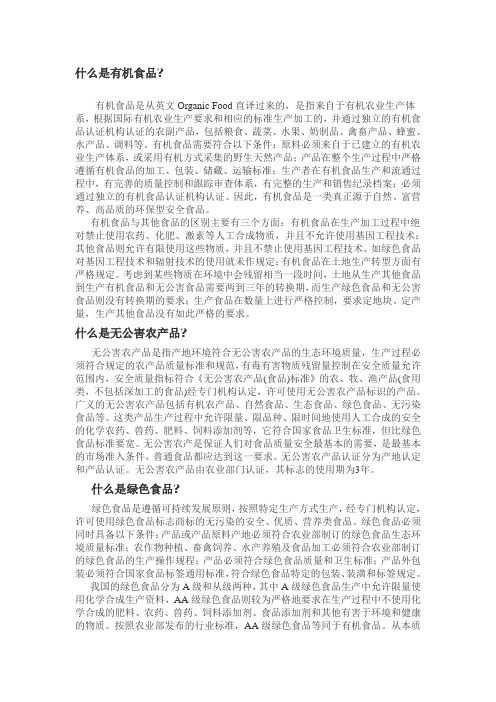
什么是有机食品?有机食品是从英文Organic Food直译过来的,是指来自于有机农业生产体系,根据国际有机农业生产要求和相应的标准生产加工的,并通过独立的有机食品认证机构认证的农副产品,包括粮食、蔬菜、水果、奶制品、禽畜产品、蜂蜜、水产品、调料等。
有机食品需要符合以下条件:原料必须来自于已建立的有机农业生产体系,或采用有机方式采集的野生天然产品;产品在整个生产过程中严格遵循有机食品的加工、包装、储藏、运输标准;生产者在有机食品生产和流通过程中,有完善的质量控制和跟踪审查体系,有完整的生产和销售纪录档案;必须通过独立的有机食品认证机构认证。
因此,有机食品是一类真正源于自然、富营养、高品质的环保型安全食品。
有机食品与其他食品的区别主要有三个方面:有机食品在生产加工过程中绝对禁止使用农药、化肥、激素等人工合成物质,并且不允许使用基因工程技术;其他食品则允许有限使用这些物质,并且不禁止使用基因工程技术。
如绿色食品对基因工程技术和辐射技术的使用就未作规定;有机食品在土地生产转型方面有严格规定。
考虑到某些物质在环境中会残留相当一段时间,土地从生产其他食品到生产有机食品和无公害食品需要两到三年的转换期,而生产绿色食品和无公害食品则没有转换期的要求;生产食品在数量上进行严格控制,要求定地块、定产量,生产其他食品没有如此严格的要求。
什么是无公害农产品?无公害农产品是指产地环境符合无公害农产品的生态环境质量,生产过程必须符合规定的农产品质量标准和规范,有毒有害物质残留量控制在安全质量允许范围内,安全质量指标符合《无公害农产品(食品)标准》的农、牧、渔产品(食用类,不包括深加工的食品)经专门机构认定,许可使用无公害农产品标识的产品。
广义的无公害农产品包括有机农产品、自然食品、生态食品、绿色食品、无污染食品等。
这类产品生产过程中允许限量、限品种、限时间地使用人工合成的安全的化学农药、兽药、肥料、饲料添加剂等,它符合国家食品卫生标准,但比绿色食品标准要宽。
有机食品的优缺点英语作文
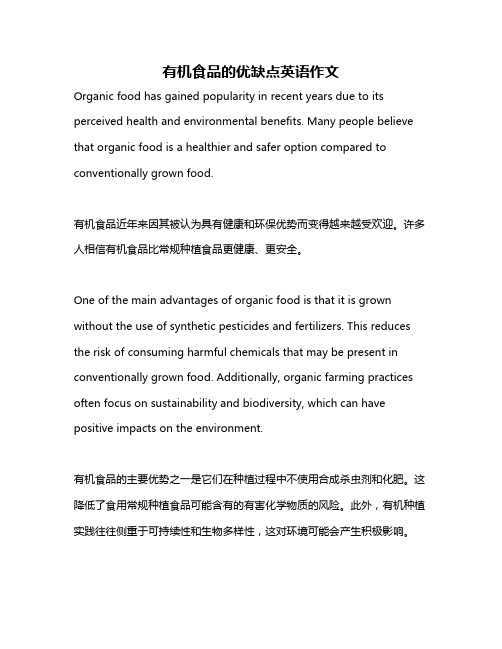
有机食品的优缺点英语作文Organic food has gained popularity in recent years due to its perceived health and environmental benefits. Many people believe that organic food is a healthier and safer option compared to conventionally grown food.有机食品近年来因其被认为具有健康和环保优势而变得越来越受欢迎。
许多人相信有机食品比常规种植食品更健康、更安全。
One of the main advantages of organic food is that it is grown without the use of synthetic pesticides and fertilizers. This reduces the risk of consuming harmful chemicals that may be present in conventionally grown food. Additionally, organic farming practices often focus on sustainability and biodiversity, which can have positive impacts on the environment.有机食品的主要优势之一是它们在种植过程中不使用合成杀虫剂和化肥。
这降低了食用常规种植食品可能含有的有害化学物质的风险。
此外,有机种植实践往往侧重于可持续性和生物多样性,这对环境可能会产生积极影响。
However, one of the biggest drawbacks of organic food is its higher cost. Organic food generally comes with a premium price tag, making it less accessible to lower-income individuals. This can create a disparity in access to healthy food options, as those with limited financial resources may not be able to afford organic products.然而,有机食品最大的缺点之一是它的高成本。
有机食品的利与弊英语作文
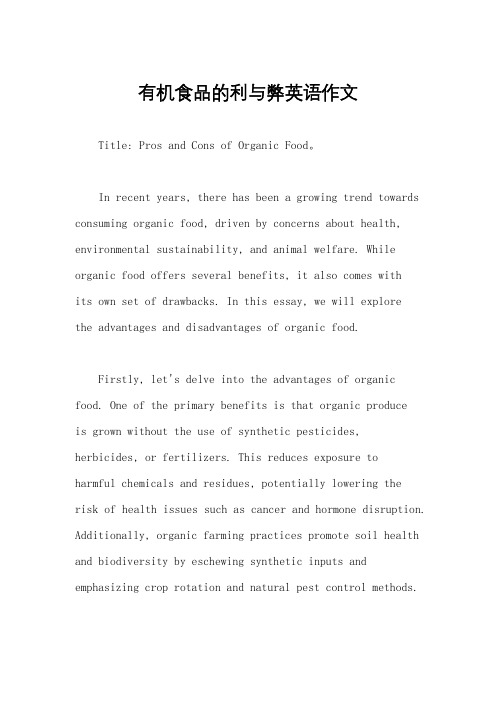
有机食品的利与弊英语作文Title: Pros and Cons of Organic Food。
In recent years, there has been a growing trend towards consuming organic food, driven by concerns about health, environmental sustainability, and animal welfare. While organic food offers several benefits, it also comes withits own set of drawbacks. In this essay, we will explorethe advantages and disadvantages of organic food.Firstly, let's delve into the advantages of organic food. One of the primary benefits is that organic produceis grown without the use of synthetic pesticides, herbicides, or fertilizers. This reduces exposure toharmful chemicals and residues, potentially lowering therisk of health issues such as cancer and hormone disruption. Additionally, organic farming practices promote soil health and biodiversity by eschewing synthetic inputs and emphasizing crop rotation and natural pest control methods.Furthermore, organic livestock farming adheres tostrict animal welfare standards, with animals having access to outdoor areas and being raised without antibiotics or growth hormones. This results in meat, dairy, and eggs that are often perceived as being of higher quality and more humane than their conventional counterparts.Moreover, organic farming practices tend to have lower environmental impacts compared to conventional agriculture. By eschewing synthetic inputs and focusing on sustainable practices like composting and cover cropping, organic farms reduce pollution of waterways and soil erosion while conserving energy and promoting biodiversity. Additionally, organic farming typically consumes less water and produces fewer greenhouse gas emissions, contributing to overall environmental sustainability.However, despite these advantages, organic food also has its drawbacks. One of the most significant drawbacks is the higher cost associated with organic products. Organic farming requires more labor-intensive practices and often yields lower crop yields, leading to higher prices forconsumers. This can make it inaccessible to low-income individuals and families, perpetuating issues of food insecurity and inequality.Additionally, there is ongoing debate and conflicting evidence regarding the nutritional superiority of organic food compared to conventional counterparts. While some studies suggest that organic produce may contain higher levels of certain nutrients and antioxidants, others find little to no difference. Thus, the perceived health benefits of organic food may be overstated, leading consumers to pay a premium for products without clear evidence of superior nutritional value.Furthermore, organic farming practices may not always be as efficient or productive as conventional methods, leading to concerns about global food security. With a growing global population and increasing pressure on agricultural resources, some argue that organic farming's lower yields and land use efficiency could exacerbate food shortages and environmental degradation.In conclusion, organic food offers several potential benefits, including reduced exposure to harmful chemicals, improved animal welfare, and lower environmental impacts. However, it also comes with drawbacks such as higher costs, uncertain nutritional advantages, and potential challenges for global food security. Ultimately, the decision to consume organic food should be based on individual preferences, values, and circumstances, weighing the trade-offs between health, environmental concerns, and affordability.。
转基因食品优缺点英文
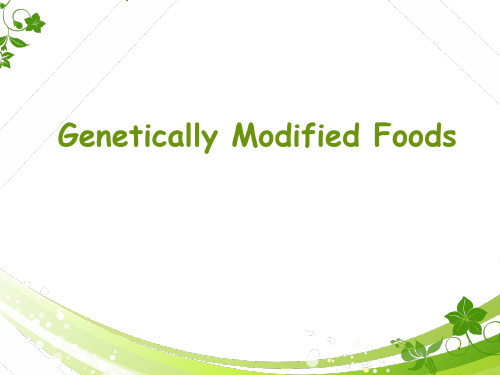
thanks!
Potatoes
Tomatoes
Beans
GM foods' advantages
Increase crop yield per unit area. Reduce the production cost. Through transgenic technology can enhance the ability
Now,there are some common GM foods in china ,such as beans,rice,tomatoes,potatoes,corn etc.
The emergence of GM foods is unavoidable, we can't blindly reject it.With the development of science and p olicy, I believe that one day people can safely eat it.
The goals of the human need to GM organisms for dir ect food or as raw material processing production of foo d is genetically modified food.
GM and Non-GM contrast
Genetically Modified Foods
What's GM foods GM and Non-GM contrast GM foods' advantages GM foods' drawbacks View
What's GM foods
有机食品比传统食物更健康的英语作文

有机食品比传统食物更健康的英语作文Organic food has become increasingly popular in recent years as more people become aware of the benefits of choosing natural and sustainable options. Many people believe that organic food is healthier than traditional foods due to the way it is grown and processed. In this essay, we will explore the reasons why organic food is considered healthier than conventional food.One of the main reasons why organic food is considered healthier is the way it is produced. Organic farming practices focus on using natural methods to grow crops and raise animals without the use of synthetic pesticides, herbicides, and fertilizers. This means that organic food is free from harmful chemicals that can accumulate in the body and have negative effects on human health. In contrast, conventional farming relies heavily on the use of these chemicals, which can have harmful effects on both our health and the environment.Furthermore, organic food is often fresher and more nutrient-dense than traditional food. Organic fruits and vegetables are usually harvested at peak ripeness, which means they are higher in vitamins, minerals, and antioxidants. Additionally, organic meat and dairy products are often produced from animals that are raised on pasture and fed anatural diet, resulting in products that are higher in beneficial nutrients like omega-3 fatty acids. In contrast, conventional food often undergoes long transportation and storage periods, which can lead to a loss of nutrients and freshness.In addition, organic food is also believed to be better for the environment and for animal welfare. Organic farming practices are more sustainable and environmentally friendly, as they promote soil health, biodiversity, and water conservation. By choosing organic food, consumers can support farming methods that are less harmful to the planet and help protect natural ecosystems. Furthermore, organic farming practices prioritize animal welfare, ensuring that animals are treated humanely and are not exposed to unnecessary stress or suffering.Overall, there are many reasons why organic food is considered healthier than traditional food. From the way it is grown and processed to its nutrient content and environmental impact, organic food offers numerous benefits that can support a healthier lifestyle. By choosing organic food, consumers can make a positive impact on their health, the environment, and animal welfare. In conclusion, organic food is a valuable and important choice for those looking to prioritize their health and well-being.。
- 1、下载文档前请自行甄别文档内容的完整性,平台不提供额外的编辑、内容补充、找答案等附加服务。
- 2、"仅部分预览"的文档,不可在线预览部分如存在完整性等问题,可反馈申请退款(可完整预览的文档不适用该条件!)。
- 3、如文档侵犯您的权益,请联系客服反馈,我们会尽快为您处理(人工客服工作时间:9:00-18:30)。
Organic food
• Organic farming and organic food refers to according to the processing mode of production and processing; Products comply with international or national organic food requirements and standards; And all the products through the national certification body certification.
Views on GM food and organic food
• Organic food plant limited, due to the growing conditions demand is high, less money human input, output, cannot satisfy human food problem, so not widely planting, and less investment in gm foods, output value, harvest, to solve the food problem has a significant contribution to the population.
Views on GM food and organic food
• Organic food and genetically modified food has its advantages and disadvantages.
• So their existence is the trend of history, is the need of human development.
3 The difference between the GM
food and organic food
4 Views on GM food and organic
food
Team members
• Wang Xiao meng • Hong Ying • Zhao Shuang qing • Geng Man yu • Guo Zheng
Russia
The US
Do not ban genetically modified food circulation
95% of the people against eatinggenetically modified food
GM food has existed about 20 years in the market
Definition of GM and organic food
Definition
GM foods
Organic food
GM foods
• Genetically modified food is a kind of food that by using modern molecular biological technology transfers some biological gene to other species to transform of genetic material and make it transfer to what people need in its shape, nutritional quality and consumption quality.
NO.2
Organic foods are not allowed to use genetic engineering technology
NO.3
Organic food is a kind of real is the result of natural, rich nutrition, high quality and environmentally friendly safe food
The difference between the GM food and orgafood in the process of production and processing of absolute ban the use of synthetic material.
PPT froLm O18GgrOoup
The comparative analysis of both GM foods and organic foods from certain
perspectives
PPT fromLO18GgrOoup
Contents
1
Team members
2 Definition of GM andorganic food
• As you know,the use of genetically modified food in our country is still in question.
• But ,what about other countries?
Attitude towards GM food
Japan
